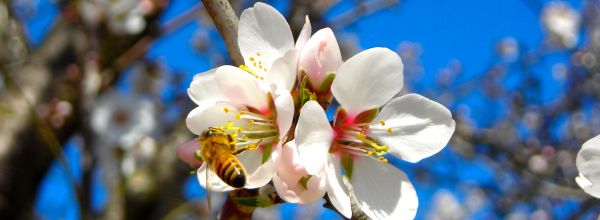Pollination Services

WHERE TO GET POLLINATION ASSISTANCE:
The Ontario Honey Bee Pollination Association (OHBPA), a program of the OBA, promotes agricultural pollination and supports beekeepers providing pollination services.
To locate members providing pollination services in Ontario and beyond click here.
To join the OHBPA click here.
ABOUT POLLINATION:
Did you know...?
- Bees help set the early vigorous blossoms.
- Larger and more uniform fruit and increased pounds per acre are associated with an increased number of bee visits.
- A higher concentration of bees in your orchard can increase the crop.
Why Use Honeybees In Your Orchards?
Although local wild populations of honeybees and other native pollinators assist in crop pollination they cannot be relied upon from year to year. Populations of these fluctuate greatly from year to year due to weather, lack of or destruction of habitat, agricultural pesticide use, and the effects of parasitic mite infestations. The local wild honeybees are disappearing from Ontario as the bee mites spread and destroy these honeybees.
In determining the number of hives per acre, the grower has to consider the number of flowers per acre. In our calculations, we allow for some native pollinators when we estimate the hive concentration rates.
For complete pollination and better quality fruit and vegetables the services of a beekeeper should be attained. Well placed hives in the orchard or field can help ensure a steady income to the farmer from year to year.
Effectiveness
The effectiveness of the bee is determined by the visits it makes between compatible varieties within the orchard. If the visits are confined on one variety they are not as effective. Repeated cross-pollination of the flowers must occur to produce the optimum set. It has been proven that some cross-pollination actually occurs within the hive. Contact between the bees causes transfer of pollen grains from the body hairs of one bee to another. The return flight of the bee even to the same variety of tree results in cross-pollination.
Pollination Recommendations
Many crops require honey bees to transfer pollen in order to have a good seed set and ensure that a good fruit develops around these seeds. Recommended density of beehives per acre for Ontario Fruit and Vegetable crops:
Hive Stocking Rates
| Apples | Standard | 1 hive per acre |
| Semi-Dwarf | 2 hives per acre | |
| Dwarf | 3 hives per acre | |
| Pears | Plums | 1 hive per acre |
| Peaches | Nectarines | 1 hive per acre |
| Cherries | Apricots | 1 hive per acre |
Small Fruit Crops
| Cranberries | 3 hives per acre |
| Blueberries | 3 hives per acre |
| Raspberries | 1 hive per acre |
| Strawberries | 1 hive per acre |
Other Field Crops require 1 Hive per acre
| Cucumbers | Melons | Pumpkins |
| Squash | Zucchini | Ginseng |
| Canola | Buckwheat | Sunflowers |
| Clovers | Trefoil | Alfalfa |
For more detailed recommendations on other crops refer to OMAF Publication 72 or AGOEX 616.
Moving Colonies of Bees
It is often required early during cold and wet spring weather. Hives must be placed early enough to help pollinate the first blossoms of the fruit. Beekeepers need to know the pollination schedule early to arrange for movement.
Inspection
All colonies are checked for queen right conditions, diseases and to ensure they are of adequate strength.
Distribution and Placement of Colonies
When possible place groups of 15 or more colonies in sunny clearings within the boundaries of an orchard. Completely shaded locations will contribute to shortened flight time. Growers can assist beekeepers by setting out hive stands ahead of time. Hives placed on the ground often end up with their entrances partially blocked by growing grasses and weeds and sometimes even mower clippings. The result is reduced access for the bees and less pollination for the grower.
Don't Spray the Bees
Poisoning of bees by orchard sprays is of great concern to beekeepers. Spraying of insecticides when trees or plants are in bloom is a violation of the Bees Act and must be avoided.
Please contact a member of the Ontario Honey Bee Pollination Association for current rental fees.
For additional information on pollination search The Canadian Pollination Initiative Best Practices website: NSERC_CANPOLIN


